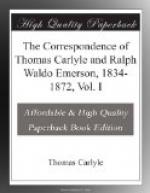For the present, I am to announce on the part of Bookseller Fraser that the First Portion of our celebrated Miscellanies have been hovering about on these coasts for several weeks, have lain safe “in the River” for some two weeks, and ought at last to be safe in Fraser’s shop today or else to morrow. I will ask there, and verify, before this Letter go. The reason of these “two weeks in the river” is that the packages were addressed “John Fraser, London,” and the people had tried all the Frasers in London before they attempted the right individual, James, of 215 Regent Street. Of course, the like mistake in the second case will be avoided. A Letter, put ashore at Falmouth, and properly addressed, but without any signature, had first of all announced that the thing was at the door, and so with this “John Fraser,” it has been knocking ever since, finding difficult admission. In the present instance, such delay has done no ill, for Fraser will not sell till the Second Portion come; and with this the mistake will be avoided. What has shocked poor James much more is a circumstance which your Boston Booksellers have no power to avoid: the “enormousness” of the charges in our Port here! He sends me the account of them last Saturday, with eyes— such as drew Priam’s curtains: L31 and odd silver, whereof L28 as duty on Books at L5 per cwt. is charged by the rapacious Custom-house alone! What help, O James? I answer: we cannot bombard the British Custom-house, and sack it, and explode it; we must yield, and pay it the money; thankful for what is still left.—On the whole, one has to learn by trying. This notable finance-expedient, of printing in the one country what is to be sold in the other, did not take Vandalic custom-houses into view, which nevertheless do seem to exist. We must persist in it for the present reciprocal pair of times, having started in it for these: but on future occasions always, we can ask the past; and see whether it be not better to let each side of the water stand on its own basis.
As for your “accounts,” my Friend, I find them clear as day, verifiable to the uttermost farthing. You are a good man to conquer your horror of arithmetic; and, like hydrophobic Peter of Russia making himself a sailor, become an Accountant for my sake. But now will you forgive me if I never do verify this same account, or look at it more in this world except as a memento of affection, its arithmetical ciphers so many hierograms, really sacred to me! A reflection I cannot but make is that at bottom this money was all yours; not a penny of it belonged to me by any law except that of helpful Friendship. I feel as if I could not examine it without a kind of crime. For the rest, you may rejoice to think that, thanks to you and the Books, and to Heaven over all, I am for the present no longer poor; but have a reasonable prospect of existing, which, as I calculate, is literally the most that money can do for a man. Not for these twelve years, never since I had a house to maintain with money, have I had as much money in my possession as even now. Allah kerim! We will hope all that is good on that side. And herewith enough of it.




